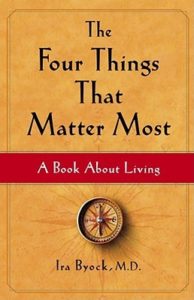The Four Things that Matter Most
Death is the most inevitable fact, yet like the three wise monkeys’ principle, “see no evil, hear no evil, speak no evil,” most Americans hope by ignoring, or not preparing for death, it will just go away.
 Three and a half million Americans will die this year. Three people per minute will die an accidental or unexpected death today, and none of them thought this day would be their last. Only a handful will have effectively communicated to their loved ones what mattered most to them before they departed.
Three and a half million Americans will die this year. Three people per minute will die an accidental or unexpected death today, and none of them thought this day would be their last. Only a handful will have effectively communicated to their loved ones what mattered most to them before they departed.
Death ends a life but not a relationship,” is one of many simple yet profound observations shared by Dr. Ira Byock in his book, “The Four Things that Matter Most: A Book About Living.” While Byock treated thousands of terminally ill patients during his thirty-year medical career as a hospice and palliative care physician he observed,
“When you talk to someone being wheeled into the operating room for transplant surgery or someone with cancer getting infused with chemotherapy for the first time and ask them what’s on their mind, the answer will ALWAYS involve people they love, ALWAYS.”
The importance of relationships led Dr. Byock to conclude that patients who came to positive life closure, were not afraid to say these four important phrases to those they loved: ‘Please forgive me,’ ‘I forgive you,’ ‘Thank you,’ and ‘I love you.’ It is that simple BUT it is not easy.
By nature, all humans are imperfect, and we inflict wounds on those we are in relationships with, intentional or not. Our imperfections lead us to our need for forgiveness, both giving it and receiving it.
Byock is clear that “Forgiveness is not about making excuses for someone’s bad behavior, and it is not the same as forgetting that someone hurt you. The adage: Forgive and Forget is ridiculous advice. To forgive someone, you do not have to forget his or her misdeeds or act as if it had never happened. Forgiving does not require forgetting… that’s amnesia! Real forgiveness requires remembering.”
It involves opening your heart in full awareness that you have been harmed or hurt and that you still feel it. Forgiveness is a generous act or process but at its core, forgiveness is about yourself rather than the other person being forgiven.
“Forgiveness involves accepting that the past cannot be changed while recognizing that your past need not control your future.”
Asking for forgiveness is healing our own heart from the harm we have inflicted on others. However, we cannot control how it is accepted or not. If you are expecting your words and expressions to be returned in kind, you are at a substantial risk of being disappointed.
Secondly, expressing gratitude by saying, “Thank You” to those we love makes positive deposits in everyone’s emotional bank. Practical tip: Take a few minutes and express your thanks and appreciation to someone by sending a simple handwritten note or email. It will brighten their day and lift your spirit.
 Saying, “I Love You” is the last of the ‘Four Things that Matters Most.’
Saying, “I Love You” is the last of the ‘Four Things that Matters Most.’
A terrific book on this topic is Gary Chapman’s, “The Five Love Languages.” Chapman explains each of us has a primary “Love Language” that resonates most with us. There are five primary love languages: words of affirmation, physical touch, receiving gifts, quality time, and acts of service.
We each use all five of these to varying degrees but usually lean heavily towards one or two. Go to the 5lovelanguages.com website to complete the free quiz. It will help you better understand how best to express your love to others in their primary love language.
Expressing the last three words, “I Love You” can be especially challenging if it has not been modeled in your life or your family.
‘Words of Affirmation’ was not my father’s Love Language. During the last week of his life, I asked him, “Dad, why did it take you 80 years to say I love you to me for the first time?” He paused, thought, and replied, “I never heard it from my father, so I assumed you knew it and guess I didn’t feel I needed to say it.”
Understanding that was not in his Love Language vocabulary freed me. I forgave him for his words unsaid. I understand now it is hard to give something you never received.
Do not wait until you are on death bed to say these “Four Things.” Use them as tools to aid you living fully, here, and now. Never miss the chance to offer forgiveness, gratitude, and love to the ones you love. You will never regret it.
By Mark Philbrick, MSN, RN, Director of Education, Transitions LifeCare